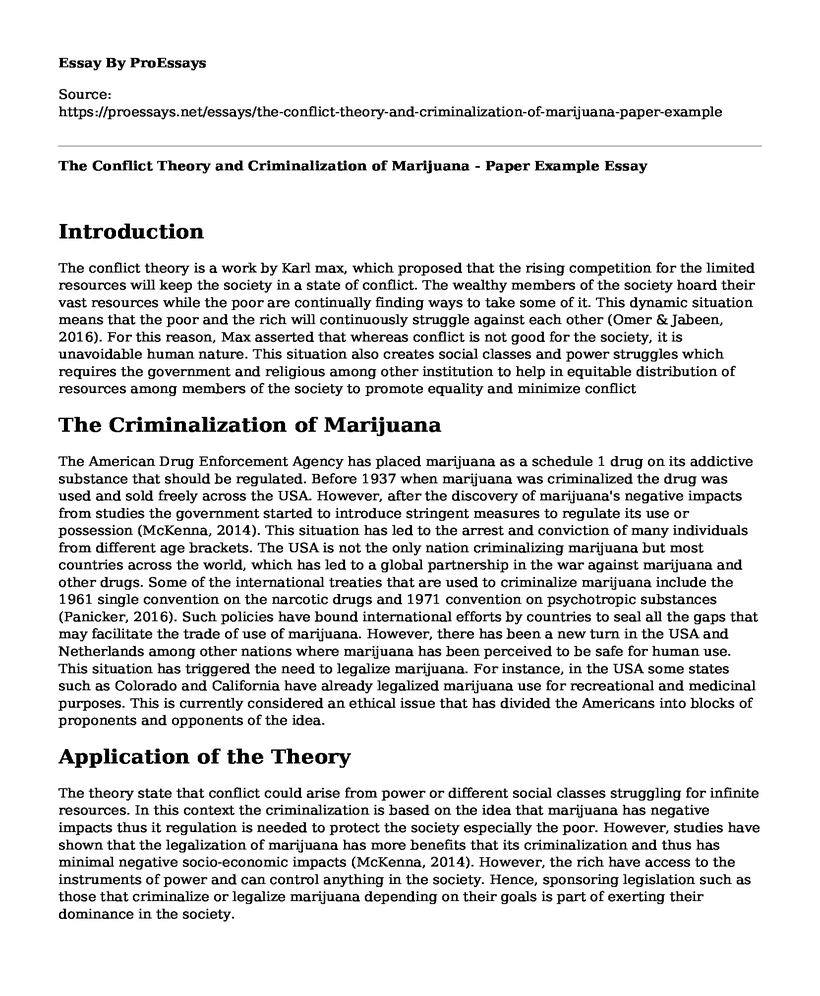Introduction
The conflict theory is a work by Karl max, which proposed that the rising competition for the limited resources will keep the society in a state of conflict. The wealthy members of the society hoard their vast resources while the poor are continually finding ways to take some of it. This dynamic situation means that the poor and the rich will continuously struggle against each other (Omer & Jabeen, 2016). For this reason, Max asserted that whereas conflict is not good for the society, it is unavoidable human nature. This situation also creates social classes and power struggles which requires the government and religious among other institution to help in equitable distribution of resources among members of the society to promote equality and minimize conflict
The Criminalization of Marijuana
The American Drug Enforcement Agency has placed marijuana as a schedule 1 drug on its addictive substance that should be regulated. Before 1937 when marijuana was criminalized the drug was used and sold freely across the USA. However, after the discovery of marijuana's negative impacts from studies the government started to introduce stringent measures to regulate its use or possession (McKenna, 2014). This situation has led to the arrest and conviction of many individuals from different age brackets. The USA is not the only nation criminalizing marijuana but most countries across the world, which has led to a global partnership in the war against marijuana and other drugs. Some of the international treaties that are used to criminalize marijuana include the 1961 single convention on the narcotic drugs and 1971 convention on psychotropic substances (Panicker, 2016). Such policies have bound international efforts by countries to seal all the gaps that may facilitate the trade of use of marijuana. However, there has been a new turn in the USA and Netherlands among other nations where marijuana has been perceived to be safe for human use. This situation has triggered the need to legalize marijuana. For instance, in the USA some states such as Colorado and California have already legalized marijuana use for recreational and medicinal purposes. This is currently considered an ethical issue that has divided the Americans into blocks of proponents and opponents of the idea.
Application of the Theory
The theory state that conflict could arise from power or different social classes struggling for infinite resources. In this context the criminalization is based on the idea that marijuana has negative impacts thus it regulation is needed to protect the society especially the poor. However, studies have shown that the legalization of marijuana has more benefits that its criminalization and thus has minimal negative socio-economic impacts (McKenna, 2014). However, the rich have access to the instruments of power and can control anything in the society. Hence, sponsoring legislation such as those that criminalize or legalize marijuana depending on their goals is part of exerting their dominance in the society.
However, the society continues to invent ways for accessing and using the marijuana. Also, the cases of legalization are based on the competition as some influential groups or individual support the use while others oppose. That is why the federal government do not recognize the use or any form or access to marijuana, while some states such as Colorado have passed legislation in support. The federal government is senior to state government hence, what the former says is law and if the later acts in contrary the situation is viewed as rebellion towards the national government, overall authority in the USA. Additionally, since the most states in the USA are fighting to legalize marijuana the international community has viewed America as rebellious toward the binding international treaties meant to keep marijuana illegal (Panicker, 2016). Ultimately it's a conflict which is unavoidable not only in the USA but across the world.
References
McKenna, G. J. (2014). The current status of medical marijuana in the United States. Hawai'i Journal of Medicine & Public Health, 73(4), 105.
Omer, S., & Jabeen, S. (2016). Exploring Karl Marx Conflict Theory in Education: Are Pakistani Private Schools Maintaining Status Quo?. Bulletin of Education and Research, 38(2).
Panicker, B. (2016). Legalization of Marijuana and the Conflict with International Drug Control Treaties.
Cite this page
The Conflict Theory and Criminalization of Marijuana - Paper Example. (2022, Aug 03). Retrieved from https://proessays.net/essays/the-conflict-theory-and-criminalization-of-marijuana-paper-example
If you are the original author of this essay and no longer wish to have it published on the ProEssays website, please click below to request its removal:
- Crime Prevention Through Environmental Design Essay
- Impacts of Advanced Technology in Studying Modern Society
- Essay Sample on Reducing Intergroup Conflict
- The Death Penalty and Capital Punishment Essay
- Essay Sample on The Effectiveness of Sherlock Holmes as a Detective
- LGBT Rights: A Fight for Equality and Dignity - Essay Sample
- Essay Example on Eisenhower & Kennedy: Protecting Civil Rights for African Americans







